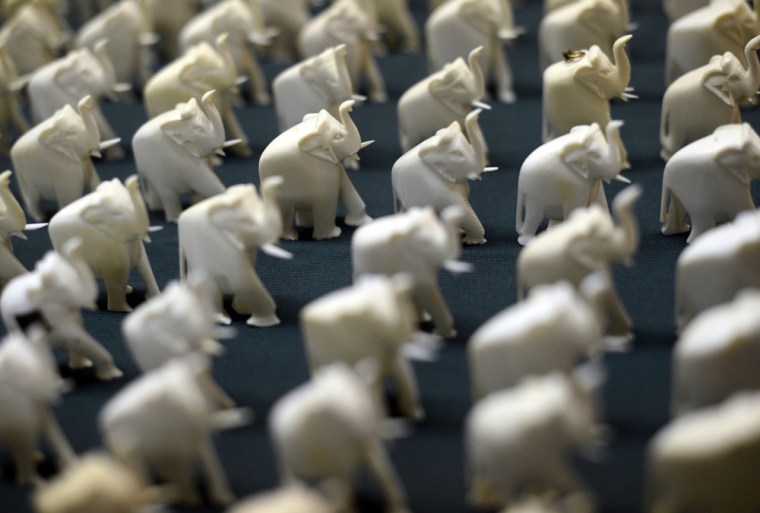Six tons of illegal ivory that has been seized by the U.S. government will be destroyed in an effort to discourage sales of accessories and art made from elephant tusks, the U.S. Department of Interior said Monday.
The U.S. Fish and Wildlife Service plans to crush six tons of ivory that the U.S. government has confiscated since commercial ivory was banned in 1989, announced Secretary of the Interior Sally Jewell.
According to the International Fund for Animal Welfare (IFAW) and the World Wildlife Fund (WWF), an increased demand for ivory jewelry, decorations and trinkets has provoked poachers to kill about 30,000 African elephants each year.
Members of WWF and IFAW hope that destroying the seized ivory will relay a message to those who buy and sell ivory in the U.S.
“By crushing this ivory stockpile, the U.S. government is sending a signal. If we're going to solve this crisis we have to crush the demand, driven by organized crime syndicates who are robbing the world of elephants,” said Carter Roberts, president and CEO of WWF.
IFAW spokeswoman Cynthia Carson said that she believes the incentive will remind people that ivory comes from elephants, saying that many people separate the product from “dead elephants” in their minds.
U.S. Fish and Wildlife Service Director Dan Ashe said that the U.S. has to be “part of the solution” in combating elephant poaching since American buyers are such a big part of the problem. “Much of the world’s trade in wild animal and plant species — both legal and illegal — is driven by U.S. consumers or passes through our ports on the way to other nations,” he said.
WWF illegal wildlife trade expert, Crawford Allan, said, “seizures of illegal wildlife products happen at ports all across the U.S. — from Manhattan to Louisville to Denver.”
Carson said that while most of the ivory is apprehended from black market smugglers, some is also taken from tourists returning to the U.S.
Allan added that Ivory was even being sold in disguise on the e-commerce website Etsy, until measures were recently implemented to halt the illegal sales.
“The key message of this crush is that ivory is not a legitimate consumer product — it should only belong to elephants,” Carson said.
Bonello said that the massive haul of ivory will be crushed starting October 8, in Denver, Colorado. She said it was still "to be determined" what would happen with the pulverized remains.
